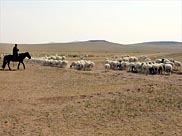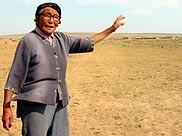September 25, 2001
 |
 |
| Sheep and goats, watched over by a herder on horseback, search for grass on almost barren ground near Bayindeligar in central Inner Mongolia. | Outside her house near Bayindeligar, Jibutsima, 78, told how the grass had disappeared and asked, ''Can it be that nature is changing?'' |
BAYINDELIGAR, China -- The situation here does not quite equal the horror of the 10 plagues of ancient Egypt -- the pastures have not been overrun by frogs or fleas, at least not yet.
But after three years of calamities including drought, an earthquake, a killer blizzard, and even a plague of locusts that ate the grasslands clean, the sheep and cattle herders of Inner Mongolia are bewildered. They look to the coming winter with dread.
"I don't understand what's happening," said Jibutsima, 78, an ethnic Mongolian woman who, like hundreds of thousands of others in this part of northern China, sees her life falling apart.
While a surge in herd sizes during a decade of good weather and booming demand for meat weakened the region's pastures, the immediate crisis was set off by an extraordinary sequence of natural disasters. [...]
The case for a human-induced change in the weather cannot be proved, [...]
Generations of Ms. Jibutsima's family have tended livestock on these same prairies. They were nomads until the early 1980's, when they settled within the thousand acres of range land that they, like many other local families, were allocated by the government.
In the 1990's, with the demand for mutton soaring and the rains good, she and her sons saved enough to buy a motorbike for herding. They even acquired a cheap truck for the three- hour drive through rutted pastures to the nearest market.
Now the truck sits broken. With pastures nearly bald and no hay for the frigid months ahead, the family plans to sell off most of its animals despite abysmal prices to try to save breeding stock -- and its future.
"Can it be that nature is changing?" said Ms. Jibutsima, who, like many Mongolians, uses a single name. "Maybe the heavens are disturbed," she added, pointing to the barren hills.
The troubles started in the summer of 1999, when the always-meager rains nearly disappeared and an earthquake destroyed many homes. In 2000, the rains failed again.
By last fall the grasses were spotty at best and the livestock thinner than usual as winter approached. Many families went deep into debt buying hay from other regions to supplement whatever grass the animals would scrounge from dormant pastures.
Then came the blizzard. For 72 hours, starting last December, in an event without known precedent here, a savage mix of snow and fine sand howled through the air, blowing so thickly that a veteran herdsman got lost and perished walking right outside his home.
Many animals froze and in the weeks that followed, as the snow and dirt hardened into an impermeable barrier, many more starved to death. Hopes of relief sprouted briefly in May, when a rainstorm brought the pastures to life.
But the locusts followed. Frenzied hordes of them seeming to come from nowhere ate most of the emerging grass. Little rain has fallen since then. The summer was hotter than normal and more than 20 colossal dust storms have blown away much of the topsoil.
For a brief time after the blizzard, the travails of Inner Mongolia attracted outside attention, and food aid from international donors has helped tens of thousands of families to avoid hunger. Still, some families, their incomes slashed, have had to pull children from school.
Ethnic Mongolians account for a good share of the herders in this central pastoral region, although decades of migration into Inner Mongolia by Han Chinese, the country's dominant group, has left the Mongolians a small minority in the province over all.
In the current drought, the responses of ethnic Mongolian and Han Chinese herders have tended to differ, said Zaorgetubater, the deputy chief of the county-level government in Abaga Banner.
"The Mongol attitude is that you keep some animals until you have nothing left, because if you lose your livestock you lose your way of life," he said. "I think for many Han it's more just an economic calculation."
Ms. Jibutsima, for one, is fearful. A few years ago, the family had 200 sheep and 100 cows. They are down to 100 sheep and 20 cows, and now most of them must be sold to buy hay for the remainder.
Hundreds of families have already lost everything. Magjia, 50, his wife, Alatanqige, 43, and their three children are spending bored days at a temporary site around their ger, the traditional felt tent. They sold off the last of their sheep and goats, and the government fenced off their ruined pastures, one of many such areas now under protection to help the grasses return.
Theirs is one of 100 displaced families that are scheduled to move into a resettlement area on the outskirts of Xilinhot, the prefecture capital. With World Bank aid, the government is building 100 brick houses with cattle pens.
Mr. Magjia tried to put the best face on his family's altered state. "We'll get by because I'm a jack of all trades," he said. "I can slaughter sheep. I'm a good singer, or I could even be a tourist guide."
Category: Falun Dafa in the Media








